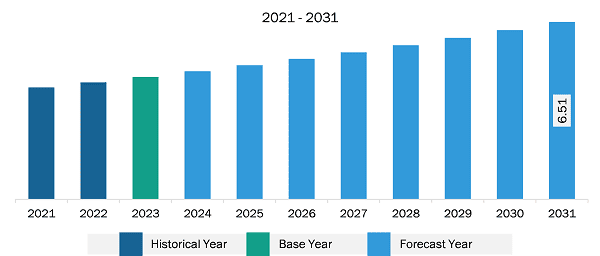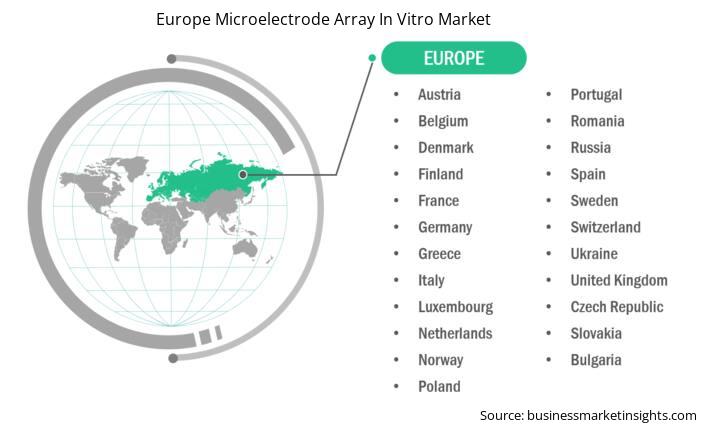Europe Microelectrode Array In Vitro Market Report (2021-2031) by Scope, Segmentation, Dynamics, and Competitive Analysis
No. of Pages: 111 | Report Code: BMIRE00032081 | Category: Life Sciences
No. of Pages: 111 | Report Code: BMIRE00032081 | Category: Life Sciences
The Europe microelectrode array in vitro market was valued at US$ 4.49 million in 2023 and is expected to reach US$ 6.51 million by 2031; it is estimated to register a CAGR of 4.7% from 2023 to 2031.
Animal models are used widely in biomedical research for human-specific diseases. However, various drug toxicology studies demonstrate that animal models cannot always predict human drug response. This is because there are wide variations in the metabolism of drugs and toxins in humans compared to animals, which makes it nearly impossible to study drug metabolism in experimental models such as laboratory rodent species. Additionally, several regulations have been implemented in recent years, particularly in Europe and North America, that restrict animal use in research activities. Similarly, Cruelty-Free International and the Fund for the Replacement of Animals in Medical Experiments are a few regulatory bodies that oppose animal-based models for research. Such strict regulatory requirements for assessing the toxicity of chemicals, cosmetics, and environmental compounds drive the adoption of microelectrode arrays for in vitro testing. As a result, pharmaceutical and biotechnology companies are encouraged to implement microelectrode array-based testing platforms for screening the neurotoxicity and cardiotoxicity of drugs.
Manufacturers of microelectrode array systems such as BMSEED offer proprietary stretchable microelectrode arrays (sMEAs) and MEASSuRE platform. The use of sMEAs enhances the validity of in vitro experiments by replicating the electrical and mechanical environment of cells, similar to their conditions in vivo, within a controlled setting. By creating a biomimetic environment for cells and tissues, sMEAs can closely mimic the human body, providing more accurate, human-relevant data early in preclinical research. This approach aims to reduce failure rates in human clinical trials.
Thus, the rising focus on developing alternatives for animal models for research fuels the microelectrode array in vitro market growth.
The microelectrode array in vitro market in Europe is segmented into the UK, Germany, France, Italy, Spain, and the Rest of Europe. Strategic development by key players, the surge in utilization of microelectrode arrays for research, and government initiatives to enhance healthcare and medical research infrastructure are anticipated to fuel the market growth in the coming years. Germany is highly recognized for quality and innovations concerning advanced diagnostic tools and research applications in neurobiology, cardiology, and drug discovery. Several prominent companies in Germany, including MaxWell Biosystems, Multi-Channel Systems, and BMSEED, are actively involved in research and development aimed at introducing innovative microelectrode array solutions, such as 3D and CMOS microelectrode array technologies. Germany has imposed stringent regulations for animal testing methods for biotechnology and pharmaceutical research. It supports the adoption and development of alternative testing technologies, such as in vitro models, including organoids and organ-on-chips. According to an article published by BIOPRO Baden-Württemberg GmbH in June 2024, the 3R Center in Tübingen received the Ursula M. Händel Animal Welfare Prize 2024, which included a reward of andeuro;80,000 (US$ 87.045 million). This award was presented in Württemberg to the German-based research center for the development of organ-on-chip (OoC) systems as alternatives to animal testing. Such innovations in neuroscience research offer opportunities for the manufacturers of microelectrode array technologies to collaborate with industry players and research institutions to develop advanced next-generation microelectrode array in vitro products. In addition, according to an article published by the University of Tübingen, German-based researchers from the Max Planck Institute for Molecular Biomedicine in Münster, developed a novel mesh microelectrode array that significantly improves the growth and electrophysiological analysis of brain organoids used in the study of Alzheimer's and Parkinson's diseases. Therefore, the microelectrode array in vitro market in Germany is positioned for significant growth, fueled by contributions from leading companies, advanced research institutions, and supportive government initiatives.

The Europe microelectrode array in vitro market is categorized into product, application, and country.
Based on product, the Europe microelectrode array in vitro market is divided into classical MEA, multiwell-MEA, and CMOS-MEA. The multiwell-MEA segment held the largest Europe microelectrode array in vitro market share in 2023.
In terms of application, the Europe microelectrode array in vitro market is segmented into cardiomyocytes, nerve, and others. The cardiomyocytes segment held the largest Europe microelectrode array in vitro market share in 2023.
By country, the Europe microelectrode array in vitro market is segmented into the UK, Germany, France, Italy, Spain, and the Rest of Europe. Germany dominated the Europe microelectrode array in vitro market share in 2023.
| Report Attribute | Details |
|---|---|
| Market size in 2023 | US$ 4.49 Million |
| Market Size by 2031 | US$ 6.51 Million |
| CAGR (2023 - 2031) | 4.7% |
| Historical Data | 2021-2022 |
| Forecast period | 2024-2031 |
| Segments Covered |
By Product
|
| Regions and Countries Covered | Europe
|
| Market leaders and key company profiles |
|
Tucker Davis Technologies; SCREEN Holdings Co., Ltd.; Plexon Inc.; MaxWell Biosystems AG; Harvard Bioscience Inc.; Axion BioSystems Inc; 3Brain AG; NeuroNexus Technologies Inc.; MicroElectrodeDevices; Blackrock Microsystems, Inc.; NMI Technologietransfer GmbH; and BMSEED are some of the leading companies operating in the microelectrode array in vitro market.

The Europe Microelectrode Array In Vitro Market is valued at US$ 4.49 Million in 2023, it is projected to reach US$ 6.51 Million by 2031.
As per our report Europe Microelectrode Array In Vitro Market, the market size is valued at US$ 4.49 Million in 2023, projecting it to reach US$ 6.51 Million by 2031. This translates to a CAGR of approximately 4.7% during the forecast period.
The Europe Microelectrode Array In Vitro Market report typically cover these key segments-
The historic period, base year, and forecast period can vary slightly depending on the specific market research report. However, for the Europe Microelectrode Array In Vitro Market report:
The Europe Microelectrode Array In Vitro Market is populated by several key players, each contributing to its growth and innovation. Some of the major players include:
The Europe Microelectrode Array In Vitro Market report is valuable for diverse stakeholders, including:
Essentially, anyone involved in or considering involvement in the Europe Microelectrode Array In Vitro Market value chain can benefit from the information contained in a comprehensive market report.